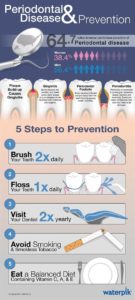If your hands bled when you washed them, you would be concerned. Yet, many people think it’s normal if their gums bleed when they brush or floss. In a 1999 study, researchers at the U.S. National Institutes of Health (NIH) found that half of Americans over 30 had bleeding gums.
Swollen and bleeding gums are early signs that your gums are infected with bacteria. If nothing is done, the infection can spread and destroy the structures that support your teeth in your jawbone. Eventually, your teeth can become so loose that they have to be extracted.
“Perio” means around, and “dontal” refers to teeth. Periodontal diseases are infections of the structures around the teeth, which include the gums, periodontal ligament and alveolar bone. In the earliest stage of periodontal disease — gingivitis — the infection affects the gums. In more severe forms of the disease, all of the tissues are involved.
For many years scientists have been trying to figure out what causes periodontal disease. It is now well accepted that various types of bacteria in dental plaque are the major villains. Researchers also are learning more about how an infection in your gums can affect your overall health.
What Causes Periodontal Disease?
Periodontal disease is caused by bacteria in dental plaque, the sticky substance that forms on your teeth a couple of hours after you have brushed. Interestingly, it is your body’s response to the bacterial infection that causes most of the problems. In an effort to eliminate the bacteria, the cells of your immune system release substances that cause inflammation and destruction of the gums, periodontal ligament or alveolar bone. This leads to swollen, bleeding gums, signs of gingivitis (the earliest stage of periodontal disease), and loosening of the teeth, a sign of severe periodontitis (the advanced stage of disease).
Article Source: COLGATEPROFESSIONAL.COM
The most important thing to remember is that Periodontal Disease is preventable! Here are 5 things to help you prevent it!
- Brush Your Teeth At Least Twice a Day
- Floss Your Teeth At Least Once a Day
- Visit Dr. Barney Two Times a Year
- Avoid Smoking and Smokeless Tobacco
- Eat a Balanced Diet
Visit our informational page for Warning Signs of Periodontal (Gum) Disease!





